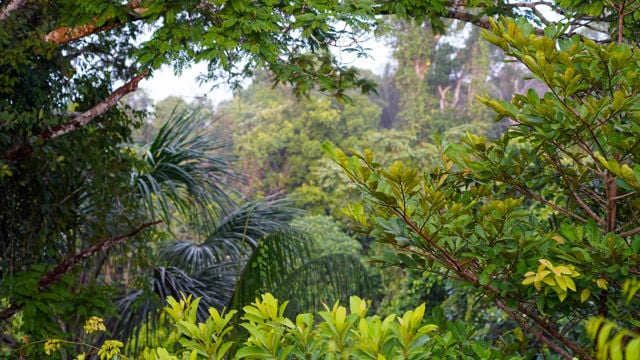Tropical forest: A common global good for climate, sustainable development and conserved biodiversity

Tropical forests provide the livelihood for millions of people. They help regulate precipitation – even far away from their own actual location – a crucial enabling factor food production. Nearly 80 per cent of the land-bound fauna and flora resides in the tropical forests. Taking care of tropical forests has a dual climate effect. If forests are left alone, they constitute key carbon stores that extract CO2 from the atmosphere and cool down the planet. However, when felled or burned, forests contribute to a significant part of the world’s greenhouse gas emissions as the carbon stores are released into the atmosphere. That is why reducing and reversing the loss of tropical forests is key in slowing down climate change, ensuring decent living conditions, and upholding biodiversity.
What
Since 2008, the Norwegian climate and forestry initiative, known internationally as NICFI (Norway’s International Climate and Forest Initiative), has contributed strongly to the international efforts to reduce greenhouse gas emissions from deforestation and the destruction of forests in developing countries. This is Norway’s most important international climate action. Because these efforts help slow down climate change, conserve biodiversity and ensure more sustainable development, we therefore contribute both to the UN Sustainable Development Goals and the overall goals for Norwegian development policy.
Why
Tropical forests are being destroyed on a large scale worldwide. This not only destroys the livelihood of indigenous peoples and local communities whose homes and livelihoods can be found in the forest, but also the biodiversity in the forests. At the same time, a significant part of the world’s greenhouse gas emissions originate from forestry and agriculture.
The causes of deforestation are complex and vary between countries. The main causes are production of agricultural products such as soy, palm oil and meat, but mining and other economic and public activity also requires land. Other underlying causes include poverty and conflict.
NICFI’s focus areas therefore include the promotion of sustainable forestry and land management by the authorities in partner countries, protection of indigenous peoples’ rights, increased transparency and prevention of corruption, helping ensure deforestation-free value chains and finance markets and combating forest crime. Much of the tropical deforestation is illegal and, on a global scale, environmental crime is the most lucrative form of crime, alongside arms and narcotics.
How
Norad manages a significant part of the NICFI budget on behalf of the Norwegian Ministry of Climate and Environment. Through the management of the grant scheme for civil society, Norad provides financial support to organisations that contribute to meeting the objectives set out in NICFI’s strategic framework.
A new call for proposals from civil society-organisations has now been published. The call is managed by Norad on behalf of NICFI.
Norad is also responsible for the management of the Central African efforts, the intergovernmental agreements with Peru and Guyana, as well as selected multilateral efforts. Moreover, Norad provides professional guidance and quality assurance to ministries and embassies involved in the initiative.
Who/Where
The NICFI efforts take place in tropical forests in Asia, Africa and Latin America.
Links
Read more on the NICFI website www.nicfi.no
Latest reports:
- Follow-up evaluation of Norway’s climate and forest initiative (norad.no)
- Global Forest Watch (Forest Monitoring, Land Use & Deforestation Trends | Global Forest Watch)
- The UNs work through three central organisations combined through the unit UNREDD Programme (un-redd.org)
- The two resulta-based funds of the World Bank for REDD+
- The rain forest initiative for the Congo basin: Central African Forest Initiative (CAFI)
- Overview of previous calls for proposals: NICFI - 2021-2025 Portfolio (norad.no)
Contact
For further information, please contact the Section for Forests